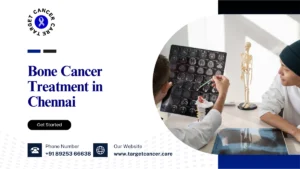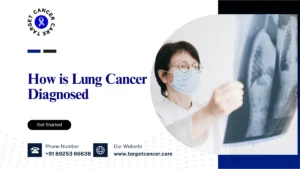Colorectal cancer treatment in Chennai is not just about medical care. It’s about finding hope, answers, and a path forward. At Target Cancer Care, we understand how scary a cancer diagnosis can be. That’s why our goal is to walk this journey with you, offering expert help and heartfelt support. Whether you’re newly diagnosed or exploring your options, this guide will explain everything in simple terms.
We offer a full range of services from screening and diagnosis to advanced treatment plans, combining state-of-the-art technology with compassionate care. With a multidisciplinary team, we aim to provide the best possible outcomes for every patient.
What is colorectal cancer?
Colorectal cancer begins in the colon or rectum, parts of the large intestine. These areas help digest food and remove waste. Cancer happens when cells grow uncontrollably, forming a tumor. At first, it might not show symptoms. But over time, it can spread and affect other parts of the body. That’s why early detection and treatment are key.
At Target Cancer Care, we focus on catching the disease early and treating it the right way. We use modern tools and caring experts to give each patient the attention they deserve. Our advanced diagnostic labs and imaging centers allow for accurate staging and personalized treatment planning.

Types of Colorectal Cancer
There are different types of colorectal cancer, depending on where they start:
- Adenocarcinoma: This is the most common type, starting in the cells that make mucus to line the colon and rectum.
- Carcinoid Tumors: These begin in hormone-producing cells.
- Gastrointestinal Stromal Tumors (GISTs): Rare cancers found in the colon wall.
- Lymphomas and Sarcomas: Less common but can affect colon tissues.
Target Cancer Care treats all types of colorectal cancer with a personalized plan. Each patient gets care that suits their cancer type and stage. We ensure treatment is based on national and international protocols, supported by our tumor board consultations.
Symptoms of Colorectal Cancer
Knowing the signs can save your life. Don’t ignore these symptoms:
- Long-lasting changes in bowel habits (diarrhea, constipation, narrow stools)
- Blood in the stool
- Pain or cramping in the abdomen
- Feeling tired or weak
- Sudden weight loss
- A feeling that the bowel doesn’t empty completely
Other symptoms can include anemia, bloating, and unexplained fatigue. These signs might be subtle at first, but paying attention and acting early makes all the difference. If you notice any of these, especially for more than a few weeks, it’s time to see a doctor. Target Cancer Care helps people every day with early checks and screenings.
What Causes Colorectal Cancer?
Cancer often results from a mix of genetics and lifestyle. Some things that raise the risk:
- A family history of colorectal cancer
- Diets low in fiber and high in fat
- Lack of exercise
- Smoking and heavy alcohol use
- Having polyps (small growths in the colon)
- Health issues like diabetes or inflammatory bowel disease
Some genetic syndromes like Lynch syndrome and familial adenomatous polyposis (FAP) also increase risk. At Target Cancer Care, we guide patients on how to manage these risks. Our team provides screenings, lifestyle advice, and early support. We also offer genetic counseling for high-risk families.
When Should You See a Doctor?
Don’t wait for symptoms to get worse. Here’s when to make an appointment:
- If you’re over 45, get screened regularly
- If you have a family history of colon or rectal cancer
- If your stool changes in shape or color
- If you feel tired often without a reason
- If there’s bleeding after a bowel movement
You should also see a doctor if you experience recurring abdominal discomfort or a sudden change in weight or appetite. Target Cancer Care believes in early action. Even a small check-up can prevent big problems later.
How is Colorectal Cancer Diagnosed?
Doctors use different tools to find cancer:
- Colonoscopy: A camera is used to check the inside of the colon.
- Biopsy: A small sample of tissue is taken and tested.
- Blood Tests: These check for signs of cancer.
- CT Scans and MRIs: These images show how far the cancer has spread.
Other diagnostic tools include PET scans, stool DNA tests, and tumor marker analysis (such as CEA levels). At Target Cancer Care, we use top-quality equipment and experts to make sure you get a correct diagnosis quickly. Accurate diagnosis is the first step toward the right colorectal cancer treatment in Chennai.
What Are the Risk Factors?
Knowing what puts you at risk can help protect your health:
- Age: Most cases happen after age 50.
- Family history: Especially first-degree relatives with colorectal cancer.
- Diet: High-fat, low-fiber diets can raise your risk.
- Sedentary lifestyle: Lack of exercise matters more than you think.
- Smoking & drinking: These habits increase the chances.
Additional risk factors include obesity, type 2 diabetes, and previous radiation therapy to the abdomen. At Target Cancer Care, we guide patients in lowering these risks through healthier choices. Prevention is part of the cure.
How is Colorectal Cancer Treated?
Treatment depends on the stage and type of cancer. The most common treatments include:
- Surgery: Removes cancerous parts of the colon or rectum.
- Chemotherapy: Uses drugs to kill cancer cells.
- Radiation: Targets cancer with energy beams.
- Targeted therapy: Focuses on cancer cells while leaving healthy cells alone.
- Immunotherapy: Helps your immune system fight cancer.
Advanced procedures like laparoscopic and robotic surgeries are also available for faster recovery. At Target Cancer Care, we design a treatment plan tailored just for you. We focus not just on removing cancer, but also on helping you feel whole again. Our rehabilitation, nutrition, and counseling services ensure comprehensive recovery.
Key Takeaways:
- Early detection can save lives, especially with colorectal cancer treatment in Chennai.
- Colon cancer treatment in Chennai is available with expert care and the latest tools.
- Understanding the colon cancer treatment cost in Chennai helps you plan better.
- Colon therapy in Chennai may include surgery, chemo, or other advanced treatments.
- Each patient at Target Cancer Care gets a customized approach.
Conclusion
Colorectal cancer treatment in Chennai is more than just a set of medical procedures. It’s about trust, early diagnosis, and personalized care. At Target Cancer Care, we are proud to be part of that journey for many families. We offer guidance, hope, and healing every step of the way. If you or your loved one is facing this challenge, don’t wait.
For more information about colorectal cancer treatment in Chennai, reach out to Target Cancer Care today. We’re here to help you take the next step forward.
Read also Causes of Vaginal Cancer.




